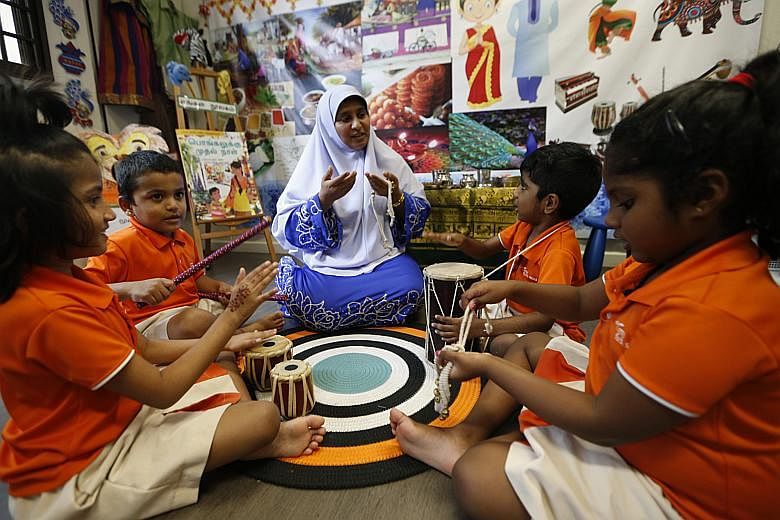SINGAPORE - Most pre-schools here offer only Mandarin as a second language, but that is starting to change.
In a bid to strengthen bilingualism and in response to growing interest from parents, some pre-school operators are opening Tamil and Malay classes.
They also plan to boost these areas of mother tongue teaching if demand increases.
EtonHouse started to offer Malay in 2016 and Tamil last year at one of its centres in Mountbatten - with 13 children there, mostly locals, taking up the languages.
NTUC First Campus also started offering Malay at 22 My First Skool centres in 2015 and Tamil language at two centres in 2016.
The anchor operator targets to expand this pilot initiative - for Malay, to 30 centres by the end of this year, and for Tamil to a total of five centres.
When the Ministry of Education (MOE) started to set up kindergartens in 2014, it also made sure its centres offered all three mother tongue languages. It has 18 centres currently, and will open another 13 in the next two years.
About 40 per cent of its 270 educators specialise in mother tongue language, the MOE told The Straits Times earlier this month. Close to 60 per cent of them teach Chinese, about 24 per cent teach Malay and 18 per cent teach Tamil.
A spokesman for the PAP Community Foundation (PCF) Sparkletots - the largest pre-school operator in Singapore with 360 childcare centres and pre-schools - said that nearly half of its centres currently offer Malay, and more than 10 per cent offer Tamil.
"We have plans to offer either one or both languages at more centres where there is demand or interest from parents," he said, adding that it is working with local and overseas partners to build up its manpower resources.
Previously, parents who wanted their younger children to learn Malay or Tamil would tend to congregate in mosque-based kindergartens or a handful of pre-schools.
One of these centres is Ramakrishna Mission Sarada Kindergarten, which has about 500 Indian children. Three-quarters of them learn Tamil while the rest take Hindi.
Ms Narayanasamy Pushpavalli, the centre's principal, said many parents speak English at home, but in recent years they have become keen to find out how they can better support their children's mother tongue learning.
"In the last few years, we are more conscious about not just teaching Tamil, but helping the kids think in Tamil, and use the language in real situations and conversations," she added.
Ms Thian Ai Ling, deputy general manager of My First Skool, said it is studying the needs on the ground, to come up with ways to teach Tamil and Malay. It currently has 18 Malay language teachers and two Tamil teachers.
"Because of the proportion of our ethnic population, we may only end up with five Malay or Indian children in a centre. Before this they were learning Chinese as we couldn't offer (Malay or Tamil) because it wasn't maximising productivity," said Ms Thian.
But now, its Tamil and Malay language teachers operate on a roving basis - they move around a handful of centres every week so that more children can benefit.
Ms Josephyne Ho, senior principal of EtonHouse Pre-school at Mountbatten, said she has seen more parents requesting Malay and Tamil lessons in recent years.
"They face some difficulty in speaking their mother tongue at home, but they want their children to learn it in pre-school to help build a foundation for primary school," she said.
Ms Jayanthi Krishnan, said it was a pleasant surprise to find the centre, where her K2 son is now learning Tamil. "Tamil is a language that is very close to my heart, but it's not widely used. It is an extension of my son's identity and I want him to have the affinity with the culture through the language," said the 41-year-old who works in the aerospace industry. "Once he goes to Primary 1 he will take Tamil and for practical reasons I can also coach him."
The opportunity to learn Malay was also a key reason Ms Nurfarhannah Dawood chose to enrol her daughter at the same centre last year.
"We want her to have that familiar ground when you can speak in Malay to others in the community, and to codeswitch between languages," said the 32-year-old part-time tutor who mainly speaks English at home.
Similarly, Ms Nurazila Zakaria, 37, opted out of Chinese lessons for her daughter in 2016 when her My First Skool centre at Pasir Ris started offering Malay.
"I would like her to learn Malay in a formal setting," said Ms Nurazila, a hospital executive. "She's not so fluent in Malay yet - forming sentences is still a challenge - but her vocabulary has expanded," she said. "It's not just learning language, because I see that her teacher will also introduce the Malay culture and traditions while speaking in Malay."
Language and culture are intertwined, said Ms Pushpavalli. "If you can't speak the language, you are not exposed to it, you may have difficulty understanding your roots," she added.
"It's about time that our children learn their mother tongue."


